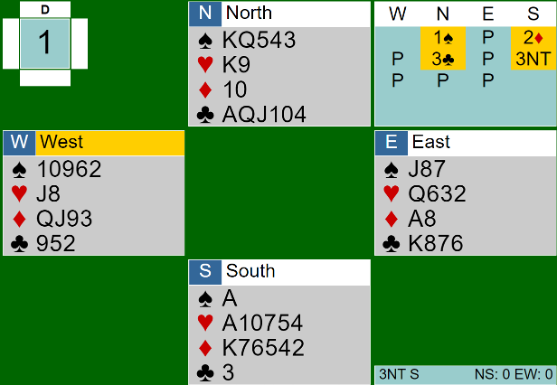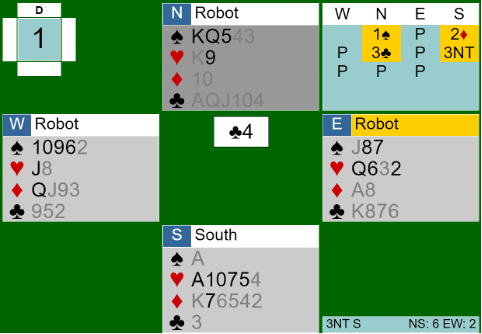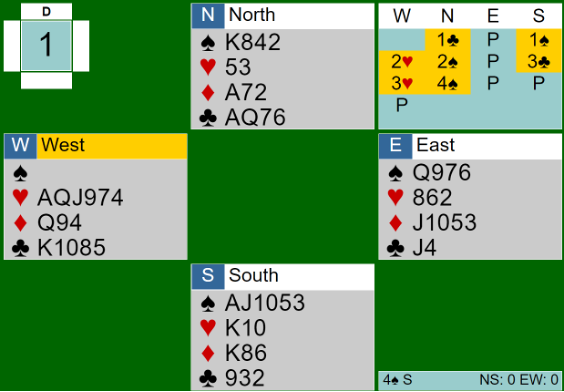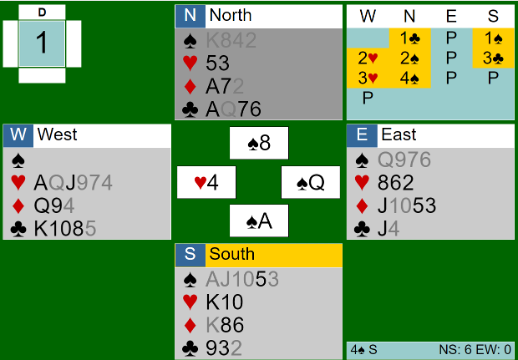


Rather late to the party, I recently discovered the high quality BBOers Festival Stars and Platinum tournaments. These are monthly robot events where, on the first Monday of the month and on each of the two following days, players with a BBO star or 5 platinum points can play 16 boards of matchpoints. By definition, this is a high quality field, and I knew that I’d be facing off against some very good players.

You don’t bid the hands, only declare them against robot defenders, although you can see (and critique) your robot self’s auction. Although I was a little intimidated by the possibility that my absurdities might be less anonymous than usual, I thought I’d have a go. To up the stakes even more I talked my husband, Mike, into betting a week’s worth of washing up on which of us could do better (likely to be a losing proposition for me, but I usually do it anyway – so much for the 21st century woman). I haven’t played against GiB in years, so went in feeling confident that I’d do terribly, not knowing anything of its style, but up for a challenge. This turned out to be a fair assessment in that I ditched an overtrick on the first board fairly ridiculously and failed to rescue myself by realising that Right Hand Robot had led its low doubleton rather than AKxx in a side suit. Mike listened pseudo-sympathetically to my whinging, with an eye on the kitchen sink.
The second board that I played was by far the most interesting of the first day’s set, and actually had me convinced that these must be set hands rather than random deals – it is such a pure example of its type. Have a look at it:

The contract is 3NT by South, and West leads a spade. You, as declarer, win the ace and take the losing club finesse to East, who plays ace and another diamond. Have a think about the hand now.
If you ducked the diamond, you are getting none of the points today. If your plan is to put the king up and run all of your black tricks and hope something good happens, you can have half marks. Let’s say you play KD, cross to dummy in hearts and run the clubs. You will reach this position:

On the last club West is toast. If he releases a diamond or a spade you trivially have the rest, and if he throws the JH you can pick East’s queen. It’s not hard to get the hearts right at the end, as there is no other hand where it really makes sense for West to discard the JH – if he can’t afford a spade or a diamond this feels like it must be his shape. The nasty twist, which is very hard to spot, is that you have to run clubs before you cash both of dummy’s spades (you can cash one of them). If you take both the KQ of spades before the last club the squeeze doesn’t function – declarer’s hand is squeezed before East’s.
Having finished the first set of 16 and being surprised to score as much as 56 provisional per cent in spite of getting a combined total of 4% on my two worst boards – completely deserved -, I asked Mike what he’d done on the hands. At this point we discovered that we had played completely different deals, which I assume to be a very welcome security feature. He nonetheless listened to me talk through my set and shared some highlights of his own, giving me a bit more of a feel for how the robot likes to play (“why did you do that? They never underlead kings.”. Good to know.). At the end of day 1 I was on 55.16% and Mike was doing rather better, with 60.29%.
Day 2
Halfway through my working day, my dear husband texted me to tell me that he’d already scored 61ish% on his 16 boards, and I hadn’t even had my second cup of tea yet. Just to rub salt in the wound, he claimed that all of his hands were trivial. I don’t know who has been feeding the dealing machine, but only a few of mine were, and, once again, it was an early hand that most interested me:

W led the 4D and I ran it round to the K. Looking at the NS cards I could see the potential to lose a spade, two hearts, a diamond, and as many as two clubs. I clearly didn’t want E to gain the lead to play a heart through, and contemplated the extent to which the auction should entice me to play spade to the K, spade to the J. It did occur to me that the 4D might be a singleton, which could leave me looking a bit daft, but when I played a spade to dummy West blew, which at least saved me from looking foolish in that suit. Seeing nothing better to do with my entry, I took a spade finesse. The club finesse seemed inevitably necessary and also very likely to be a winner, so my next moves were a club to the Q and a spade to the J, followed by the AS, to reach this position:

I now need to play my final spade to make this contract by force – more on that later – but I played two rounds of clubs instead, hoping to find West with Kxx going in, having started with 0643 shape. This would set up my last club for a diamond discard, holding my losers to one club and two hearts. When the clubs didn’t break, West correctly exited with a club, forcing me to ruff. I now played a diamond. If West had put the Queen up, I would now have gone down, but when he failed to do so I could play ace and another diamond, endplaying him to score a heart trick.
But why does cashing the last spade make the contract? Have a look at the position again. What is West supposed to throw on this? Clearly a heart is a terrible idea, and if he throws a club I can set up a club trick to throw my diamond away, as I’d initially hoped to. So he has to throw a diamond. This turns out to be no good either – I can cash the ace of diamonds and play ace and a club, throwing him in to lead hearts for me.
If West had held that 0643 shape I played him for I can still afford to cash the last trump but I’m going to have to guess what to do when he throws a diamond: if he is 0643 the line that I’ve just mentioned won’t work very well, and I’d need to play ace and another club without touching diamonds.
The next 11 boards were similarly spicy, although I finished with 4 quick claims, which I imagine were all flat across the field. When the smoke cleared, I was on 60.74% for the day, a good improvement on yesterday but not enough to seriously dent Mike’s lead, as he scored 61.70%. I would have to cross my fingers for tomorrow.
Day 3
I came home from work exhausted on day 3, and sadly this was evident in my play. I had enough flat boards to eke out 52.98% in spite of failing to realise on one board that if my side had 7 trumps, opponents must hold 6, and having to squeeze someone on a different hand and hope they threw their small heart because I couldn’t remember if my own heart spot was high or not (spoilers: it wasn’t until right hand robot threw his). Mike’s 52.01% on the day had made him catchable but the truth is that I made too many silly mistakes to have had much chance. He was gracious in victory, however, and only gloated a little as he made me a cup of tea. He even cleaned the mug when I’d drunk it!
I hugely enjoyed playing in this tournament and have definitely caught the robot bug. The sets were the right length to be worth playing without being a huge commitment, and the competition was strong enough to make me feel I had to work, but not so scarily strong that I was automatically doomed to a bottom if I made a single mistake (unless it was leaving a small trump outstanding. That one was deserved). I really enjoyed the social element of talking through the hands with Mike and have encouraged various friends to enter next time so we can have a friendly competition amongst ourselves. Clearly playing the same hands as each other would be ideal for this, but I think that security considerations are important – I know that I’d quickly lose interest if it felt like people knew the hands already. Another nice touch in the way that the tournament was run is that my fears of public shame came to naught. While you can look at how an individual player played each board it doesn’t list who did what on the traveller, just the frequency and an example movie for each unique score. This means that you can look at what your friends did by searching them by name but there is no “naming and shaming” in a wider sense. Phew!
Sarah Bell is a professional bridge player, writes a regular column in English Bridge and is a full time teacher. She represented England in their Mixed team and won a silver medal in the World Women's Pairs. She's served on the EBU's Laws and Ethics Committee and was founding chair of their Online Ethics Investigation Group.
The BBOers Festival is a monthly three-day bridge festival with games for everyone. There are games for all levels; a multi-day survivor, a country vs country championship, daylong reward games as well as an ACBL sanctioned event. Click here to find out more about all the festival games.




Enjoyed Sarah Bell article- thanks